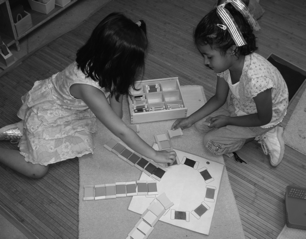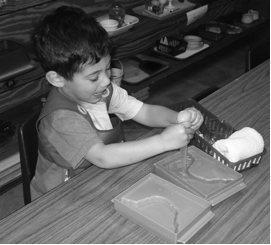Academics -- The Primary Program (3-6 year olds)
THE PRIMARY LEVEL is where Maria Montessori began in earnest to study and serve children. Montessori observed that young students in this age range could learn far more than most adults imagined. Our Montessori Primary program strives to represent an authentic model of Dr. Montessori’s original elements: the carefully prepared environment, aesthetically pleasing materials, a mixed-age grouping, and a comprehensive hands-on curriculum. The Primary classrooms offer a variety of rich opportunities for children to work freely within a secure, orderly, and welcoming environment. The classes offer a developmental approach for educating the whole child. The Primary level helps children as they obtain new information so that they can distinguish it, categorize it, and relate it to what they already know.
 THE MONTESSORI METHOD encourages respect for oneself, others, and the environment. The fundamental motivation of the Montessori approach is to prepare the student for a lifetime of learning by promoting independence, inquiry, and self-education. Our Primary teachers encourage the children to relate to one another with kindness and collaboration. The younger children have older peer models. The older children have the opportunity to assume leadership positions. Besides learning from one another, the children learn independently. Under the supervision of the teacher, each student works on a personalized, self-paced work plan.
THE MONTESSORI METHOD encourages respect for oneself, others, and the environment. The fundamental motivation of the Montessori approach is to prepare the student for a lifetime of learning by promoting independence, inquiry, and self-education. Our Primary teachers encourage the children to relate to one another with kindness and collaboration. The younger children have older peer models. The older children have the opportunity to assume leadership positions. Besides learning from one another, the children learn independently. Under the supervision of the teacher, each student works on a personalized, self-paced work plan.
THE MONTESSORI PRIMARY CURRICULUM essentially covers Pre-Kindergarten through Kindergarten skills. Graduates of this program are prepared for transition to our Montessori Elementary Class (or entry into any 1st Grade). The curriculum focuses on five major areas:
1. The Practical Life Exercises present the skills of caring for one’s environment and person. Adults may consider tasks like dusting, polishing, and washing to be ordinary, but to the child they are special and empowering. They provide the child with the opportunity to contribute in a meaningful way to family life and the society. During these exercises, emphasis is placed on performing with efficient movement and coordination.
2. The Sensorial Materials are designed to help increase the child's perception of color, size, shape, texture, weight, and more. The child develops a keen eye for discriminating similarities, differences and gradations.
3. The Language Arts Exercises begin by providing a precise naming vocabulary for the things, people, and scenarios around the child. The student starts to discern the different sounds in words by listening to songs, poems, and stories. As the vocabulary is enriched, the letter symbols and their corresponding sounds are introduced naturally. Our reading curriculum emphasizes the development of a strong phonics background in coordination with a meaningful sight-reading vocabulary.
 4. Mathematics Skills are naturally hands-on because children like to touch and move objects as they count them. Our students explore the basic math operations by using specialized materials to count, combine, separate, and share quantities. As the children advance, they discover many number concepts such as sequencing, addition, multiplication, subtraction, division, fractions, telling time and problem-solving strategies.
4. Mathematics Skills are naturally hands-on because children like to touch and move objects as they count them. Our students explore the basic math operations by using specialized materials to count, combine, separate, and share quantities. As the children advance, they discover many number concepts such as sequencing, addition, multiplication, subtraction, division, fractions, telling time and problem-solving strategies.
5. The Cultural Activities provide enrichment in the various areas of Science, Social Studies, Art and Music. These areas are a natural extension of the classroom, capitalizing on the child’s innate curiosity and creativity. The students foster an appreciation for the world around them through their cultural investigations and experiences.
THE PRIMARY CLASS is available as a half-day or full-day program. Our morning Primary classes all provide traditional Montessori work periods, implementing the important components of the Montessori method and curriculum.
FULL-DAY PRIMARY, in some Montessori schools, is offered only to older students. However, at CHILD Montessori School we recognize that many parents want to take advantage of the unique qualities of the Montessori environment, but also need a full day of care for their children. Nevertheless, our experience as Montessori educators shows us that afternoon work periods must be carefully designed to avoid creating distaste for school by pushing small children past their absorption level. Younger students need a more tranquil afternoon with a time for resting provided.